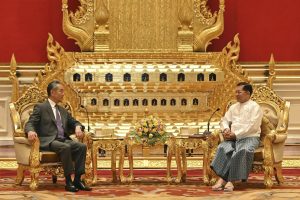China’s Foreign Minister Wang Yi met yesterday with the head of Myanmar’s military junta, during which the two discussed border security and the latter’s quixotic plans for elections. The state-run Global New Light of Myanmar reported yesterday that Wang and Senior Gen. Min Aung Hlaing discussed the establishment of “peace and stability in the border region,” where ethnic armed groups have captured significant amounts of territory from the Myanmar military in recent weeks.
The report claimed that Wang expressed support for the junta’s efforts “in implementing the five-point roadmap for ensuring peace and stability of the State and development and making preparations to hold a free and fair multiparty democratic general election.” The report also paraphrased the Chinese foreign minister as saying that Beijing “opposes” the recent ethnic armed group attacks on towns and villages in northern Shan State. (The meeting also disproved rumors that Min Aung Hlaing was overthrown this week in an internal coup.)
According to the Chinese state news agency Xinhua, Wang said that China “supports Myanmar’s efforts towards an early political reconciliation within the constitutional framework.” He also said that China “opposes chaos or conflict in Myanmar, opposes external forces interfering in Myanmar’s internal affairs” and “supports Myanmar in maintaining its independence, sovereignty, national unity, and territorial integrity.”
While Wang visited Myanmar in July 2022, yesterday was the first time that he had met Min Aung Hlaing since the coup that he led in February 2021. His visit to the country, which also involved a meeting with the 91-year-old former junta leader Than Shwe, comes a week after Deng Xijun, China’s special envoy for Myanmar, held talks with the junta leader.
This burst of diplomatic activity has no doubt been prompted by the ongoing rebel offensives that have seen the Myanmar military lose significant amounts of territory to resistance groups over the past two months. In late June, the Three Brotherhood Alliance of ethnic armed groups launched the second phase of its Operation 1027 offensive, which has since made rapid progress along the axis of the major highway linking Mandalay to the Chinese border.
In northern Shan State, the Myanmar National Democratic Alliance Army (MNDAA) this month succeeded in overrunning Lashio, the largest city in northern Shan State. This consigned the military junta to perhaps its most significant defeat since the coup of February 2021, and one that marks “a watershed moment in Myanmar’s conflict.”
Further south, the Ta’ang National Liberation Army (TNLA) and allied People’s Defense Forces have made similar progress, capturing Mogok, a ruby-mining center in Mandalay Region, as well as Nawnghkio and Kyaukme, two towns sitting on the China-bound highway. Today, the TNLA and its PDF allies also claimed to have seized the town of Hsipaw, further along the highway to the north.
While the Chinese and Myanmar state media reports about the Wang-Min Aung Hlaing meeting were filled with references to ceremonial gift exchanges and the two nations’ histories as “good neighbors and old and good friends,” the tone of the talks is likely to have been a good deal more frosty.
The recent rebel gains have clearly strained relations between Naypyidaw and Beijing. China is believed to have approved the first phase of Operation 1027, at least initially, due to the military junta’s reluctance to crack down on online scam operations in the Kokang region along the border with China, which has since been occupied by the MNDAA. But there are strong signs that after helping broker the ceasefire agreement between the Alliance and the Myanmar military in January, China has been opposed to the resumption of Operation 1027.
While China has continued to support the coup regime, it is no doubt also deeply frustrated with Min Aung Hlaing, whose takeover has derailed a number of Chinese initiatives in Myanmar – literally, in the case of the long-planned railway line linking Mandalay to the Chinese border. The military’s inability to respect the ceasefire brokered by Chinese negotiators in January has raised the specter of prolonged instability along the corridor linking China’s Yunnan province to the central dry zone and onto the sea, with secondary effects on flows of trade and the progress on key China-backed infrastructure projects.
The Myanmar military, always suspicious of Chinese intentions in Myanmar, has meanwhile hinted at Chinese support for the Three Brotherhood Alliance, with Min Aung Hlaing claiming recently that these groups were receiving weapons, including drones and short-range missiles, from “foreign” sources. The military has also toyed with patriotic anti-Chinese rhetoric as the ethnically Chinese MNDAA advances.
Richard Horsey of the International Crisis Group told The Associated Press that China did not care much whether or not the military was in charge in Myanmar. “The main issue with the regime, in Beijing’s view, is that it is headed by someone they distrust and dislike, and who they see as fundamentally incompetent,” he said.
Above all, recent events demonstrate that while China’s influence with the major ethnic armed groups in the border region is strong, and while these groups need good relations with China, they are far from being mere Chinese proxies. Much the same extends to China’s influence over the Myanmar military and over Min Aung Hlaing, who, Horsey said, “is known to harbor particularly strong anti-Chinese views.”
As Anthony Davis wrote for Asia Times last week, the continued gains of the Three Brotherhood Alliance have now put Beijing in a tricky spot. The Chinese government, he wrote, now “appears caught between the Scylla of the Brotherhood and aggressive PDFs it cannot rein in and the Charybdis of its support for a regime in Naypyidaw led by generals whose floundering defeats and potential collapse have set at risk years of economic and political investment in Myanmar.”

































